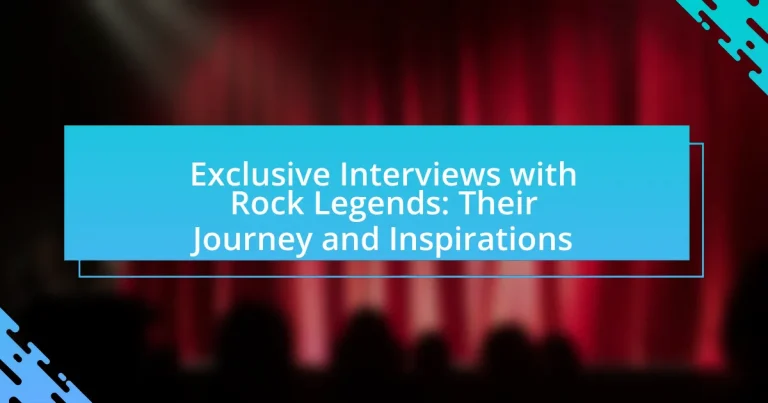Exclusive interviews with rock legends provide in-depth insights into the careers, personal experiences, and creative processes of iconic musicians. These conversations reveal unique stories about their journeys in the music industry, the inspirations behind their work, and the challenges they faced, contributing to a deeper understanding of their music and legacy. The significance of these interviews lies in their ability to contextualize the artists’ contributions within cultural and societal frameworks, influencing both fans and emerging musicians. Key themes include resilience, authenticity, and the impact of personal and societal experiences on their artistry, making these interviews a vital resource for appreciating the evolution of rock music.

What are Exclusive Interviews with Rock Legends?
Exclusive interviews with rock legends are in-depth conversations with iconic musicians that provide insights into their careers, personal experiences, and creative processes. These interviews often reveal unique stories about their journey in the music industry, their inspirations, and the challenges they faced. For instance, interviews with artists like Paul McCartney or Jimi Hendrix have documented their artistic evolution and the cultural impact of their work, showcasing how their experiences shaped their music and legacy.
Why are these interviews significant in the music industry?
These interviews are significant in the music industry because they provide unique insights into the creative processes and personal experiences of influential artists. By sharing their journeys and inspirations, rock legends help to contextualize their music, allowing fans and industry professionals to understand the emotional and cultural factors that shaped their work. For instance, interviews with artists like Bruce Springsteen or David Bowie often reveal the socio-political influences that inspired their iconic songs, thereby enriching the listener’s appreciation and connection to the music. This depth of understanding can also influence emerging artists and industry trends, making these interviews a vital resource for both historical documentation and contemporary music discourse.
What unique perspectives do rock legends provide through their stories?
Rock legends provide unique perspectives through their stories by sharing personal experiences that reflect the cultural and social dynamics of their times. These narratives often reveal insights into the struggles and triumphs of their careers, illustrating how they navigated challenges such as addiction, fame, and artistic expression. For instance, Eric Clapton’s autobiography details his battle with substance abuse and the impact of loss, offering a candid look at the human side of a rock icon. Such stories not only highlight individual resilience but also resonate with broader themes of societal change, making their experiences relatable and impactful for audiences.
How do these interviews contribute to the legacy of rock music?
Interviews with rock legends significantly contribute to the legacy of rock music by preserving firsthand accounts of the genre’s history and evolution. These interviews provide insights into the creative processes, personal experiences, and cultural contexts that shaped iconic songs and movements. For instance, interviews with artists like Bob Dylan or Mick Jagger reveal the social and political influences that informed their music, thereby enriching the understanding of rock’s impact on society. Additionally, these conversations often highlight the struggles and triumphs of musicians, creating a narrative that connects new generations to the roots of rock music. This documentation serves as a vital resource for historians, fans, and aspiring musicians, ensuring that the stories and lessons of rock music endure over time.
Who are considered rock legends in the music world?
Rock legends in the music world include iconic figures such as Jimi Hendrix, Led Zeppelin, The Beatles, and Janis Joplin. These artists are celebrated for their groundbreaking contributions to rock music, with Jimi Hendrix revolutionizing guitar playing, Led Zeppelin pioneering hard rock and heavy metal, The Beatles transforming popular music with innovative songwriting and studio techniques, and Janis Joplin being a powerful voice of the counterculture movement. Their influence is evident in the continued popularity of their music and the lasting impact they have had on subsequent generations of musicians.
What criteria define a rock legend?
A rock legend is defined by their significant impact on the music industry, characterized by exceptional talent, innovation, and influence on both peers and fans. This includes a history of groundbreaking albums, iconic performances, and a lasting legacy that shapes the genre. For instance, artists like Jimi Hendrix and Freddie Mercury are celebrated not only for their musical prowess but also for their ability to redefine rock music and inspire generations. Their contributions have led to numerous awards, record sales, and cultural recognition, solidifying their status as legends in the rock genre.
Which iconic figures are frequently featured in these interviews?
Iconic figures frequently featured in these interviews include legendary rock musicians such as Mick Jagger, Paul McCartney, and Jimi Hendrix. These artists are often highlighted due to their significant contributions to rock music and their enduring influence on the genre. For instance, Mick Jagger’s role as the frontman of The Rolling Stones has made him a central figure in rock history, while Paul McCartney’s work with The Beatles has left an indelible mark on music culture. Jimi Hendrix is celebrated for his innovative guitar techniques and has become a symbol of the 1960s rock movement.
How do rock legends describe their journey in music?
Rock legends often describe their journey in music as a blend of passion, struggle, and evolution. For instance, artists like Bruce Springsteen emphasize the importance of storytelling and personal experiences in shaping their music, reflecting on how their backgrounds influenced their songwriting. Similarly, legends such as Mick Jagger highlight the transformative power of live performances and the connection with audiences as pivotal moments in their careers. These insights reveal that their journeys are marked by both personal growth and the impact of external influences, showcasing a dynamic interplay between individual artistry and the broader cultural landscape.
What challenges did they face on their path to success?
Rock legends faced numerous challenges on their path to success, including intense competition, financial instability, and personal struggles. For instance, many artists encountered difficulties in securing record deals due to a saturated market, which often led to frustration and setbacks. Financial instability was prevalent, as initial earnings from music sales and performances were often insufficient to sustain their careers, forcing them to take on side jobs. Additionally, personal struggles such as substance abuse and mental health issues frequently hindered their progress, impacting both their professional and personal lives. These challenges illustrate the complex journey rock legends navigated to achieve success in the music industry.
How did their early experiences shape their musical careers?
Early experiences significantly shaped the musical careers of rock legends by influencing their artistic development and style. For instance, many musicians grew up in environments rich in musical exposure, such as households where various genres were played, which fostered their passion for music. Additionally, formative experiences like attending live concerts or participating in school bands provided practical skills and inspiration. These foundational moments often led to the formation of unique sounds and identities, as seen in artists who cite specific influences from their childhood, such as iconic albums or local music scenes. This connection between early experiences and later musical expression is evident in interviews where artists reflect on how their backgrounds informed their songwriting and performance styles.
What inspirations do rock legends cite in their interviews?
Rock legends often cite a variety of influences, including other musicians, personal experiences, and cultural movements. For instance, artists like Eric Clapton have mentioned the profound impact of blues musicians such as B.B. King and Robert Johnson on their work. Similarly, Kurt Cobain cited the punk rock scene and bands like the Sex Pistols as significant inspirations for his music and attitude. Additionally, many rock legends reference societal issues and personal struggles as driving forces behind their songwriting, reflecting the broader cultural context of their times. These inspirations are frequently discussed in interviews, providing insight into the creative processes that shaped their iconic sounds.
Which artists or genres influenced their musical style?
The musical style of rock legends has been influenced by various artists and genres, including blues, jazz, and folk music. For instance, artists like Chuck Berry and Muddy Waters significantly shaped the sound of rock and roll, while jazz musicians such as John Coltrane introduced complex rhythms and improvisation techniques. Additionally, folk artists like Bob Dylan brought lyrical depth and storytelling to rock music, further diversifying its influences. These genres and artists collectively contributed to the evolution of rock music, creating a rich tapestry of sounds and styles that define the genre today.
How do personal experiences and societal events shape their music?
Personal experiences and societal events significantly shape musicians’ music by influencing their themes, lyrics, and emotional expression. For instance, rock legends often draw from their own life struggles, relationships, and pivotal moments, which resonate in their songwriting. Historical events, such as wars, social movements, or cultural shifts, also inspire musicians to address broader societal issues, as seen in songs like “Fortunate Son” by Creedence Clearwater Revival, which critiques the Vietnam War. This connection between personal and societal narratives creates a rich tapestry in their music, allowing listeners to relate on multiple levels.
How do these interviews impact fans and aspiring musicians?
Interviews with rock legends significantly impact fans and aspiring musicians by providing insights into the creative processes and personal journeys of influential artists. These discussions often reveal the challenges and triumphs faced by musicians, which can inspire fans to pursue their own musical aspirations. For instance, when legends share their stories of perseverance, it encourages aspiring musicians to overcome obstacles in their careers. Additionally, these interviews often highlight specific techniques and philosophies that successful artists employ, offering practical guidance to those looking to improve their craft. The emotional connection fans feel when hearing these personal narratives fosters a deeper appreciation for the music, enhancing their overall experience and engagement with the genre.
What lessons can fans learn from the journeys of rock legends?
Fans can learn resilience and the importance of authenticity from the journeys of rock legends. Many rock legends, such as Freddie Mercury and Kurt Cobain, faced significant personal and professional challenges, yet they persevered and remained true to their artistic vision. For instance, Freddie Mercury’s battle with societal expectations and his eventual embrace of his identity led to groundbreaking music that resonated with millions. Similarly, Kurt Cobain’s struggles with fame and mental health highlighted the necessity of addressing personal issues while navigating a public career. These examples illustrate that overcoming adversity and staying authentic can lead to impactful artistry and inspire fans to pursue their own passions despite obstacles.
How do these stories inspire the next generation of musicians?
Stories of rock legends inspire the next generation of musicians by showcasing resilience, creativity, and the transformative power of music. These narratives often highlight the struggles and triumphs faced by iconic artists, demonstrating that perseverance in the face of adversity can lead to success. For instance, the journey of artists like Jimi Hendrix, who overcame significant personal challenges to revolutionize guitar playing, serves as a powerful motivator for aspiring musicians. Additionally, these stories often reveal the importance of authenticity and self-expression, encouraging young artists to find their unique voice in a competitive industry. By learning from the experiences of their predecessors, emerging musicians can gain valuable insights into the dedication and passion required to pursue a career in music.
What are the common themes found in these interviews?
The common themes found in these interviews include the importance of personal experiences, the influence of cultural and musical backgrounds, and the role of perseverance in achieving success. Personal experiences often shape the artists’ music and lyrics, reflecting their journeys and struggles. Cultural and musical backgrounds provide a foundation for their unique sounds and styles, showcasing diversity in rock music. Additionally, perseverance is frequently highlighted as a critical factor in overcoming challenges and achieving longevity in the industry, with many artists sharing stories of resilience and determination.
How do themes of resilience and creativity manifest in their stories?
Themes of resilience and creativity manifest in the stories of rock legends through their ability to overcome personal and professional challenges while continuously innovating their music. For instance, many artists recount experiences of hardship, such as addiction or loss, which they transformed into powerful lyrics and melodies, showcasing their resilience. Additionally, their willingness to experiment with different musical styles and collaborate with diverse artists highlights their creative spirit. This is evident in the works of musicians like David Bowie, who reinvented his persona multiple times, and Joni Mitchell, who pushed the boundaries of folk music. These examples illustrate how resilience fuels creativity, allowing artists to express their journeys and inspire others.
What role does collaboration play in their musical journeys?
Collaboration plays a crucial role in the musical journeys of rock legends by enhancing creativity and expanding artistic horizons. Many iconic rock bands, such as The Beatles and Queen, achieved their groundbreaking sound through collaborative songwriting and diverse musical influences. For instance, The Beatles’ partnership between John Lennon and Paul McCartney resulted in timeless classics, showcasing how their combined talents led to innovative compositions that shaped the music industry. This collaborative dynamic not only fosters unique musical styles but also allows artists to learn from one another, ultimately enriching their individual artistry and contributing to their lasting legacies.
How can fans access these exclusive interviews?
Fans can access these exclusive interviews through the official website dedicated to the series, where they are published regularly. The website features a subscription option that allows fans to receive notifications about new interviews and access archived content. Additionally, select interviews may be available on streaming platforms or through social media channels associated with the series, providing multiple avenues for fans to engage with the content.
What platforms or media outlets frequently feature these interviews?
Platforms and media outlets that frequently feature interviews with rock legends include Rolling Stone, Billboard, and NME. These publications are known for their extensive coverage of music and artist profiles, often providing in-depth interviews that explore the journeys and inspirations of iconic musicians. For instance, Rolling Stone has a long history of publishing exclusive interviews with rock artists, making it a primary source for fans and industry professionals alike.
How can fans engage with the content and share their thoughts?
Fans can engage with the content and share their thoughts by participating in online forums, social media discussions, and comment sections related to the interviews. These platforms allow fans to express their opinions, ask questions, and connect with other enthusiasts. For instance, social media platforms like Twitter and Instagram often host discussions where fans can tag the interview subjects or use specific hashtags to join the conversation. Additionally, dedicated fan websites and forums provide spaces for in-depth discussions and sharing of personal insights about the rock legends’ journeys and inspirations.
What practical tips can aspiring musicians learn from rock legends?
Aspiring musicians can learn the importance of authenticity and perseverance from rock legends. Many iconic musicians, such as Bruce Springsteen and Janis Joplin, emphasize staying true to one’s artistic vision and personal experiences, which resonates deeply with audiences. Additionally, rock legends often highlight the necessity of relentless practice and dedication; for instance, Jimi Hendrix famously practiced for hours daily, which contributed to his exceptional guitar skills. These insights underscore that success in music requires both genuine expression and a strong work ethic.
















